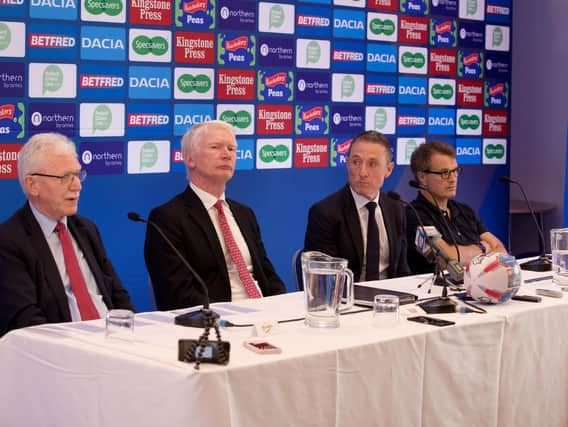COMMENT: Why Super League and Robert Elstone were always set to fail


When Robert Elstone was announced as Super League’s chief executive officer in June 2018 - seemingly a dynamic force to drive the competition into a bright, new era - he almost had to wait his turn to get a word in.
That’s because he was joined on the press conference top-table by three club owners; Wigan Warriors’ Ian Lenagan, St Helens’ Eamonn McManus and Warrington Wolves’ Simon Moran.
Advertisement
Hide AdAdvertisement
Hide AdIt set the tone. Elstone immediately looked like their puppet.
Yes, he had his own ideas and an obvious passion and enthusiasm for the sport.
However, he would never truly get a chance to lead because he didn’t have any true power.
When it came to anything of significance, all 12 Super League clubs - whoever they were at the time - got a vote with the executive having one, too, for what little it was worth.
Advertisement
Hide AdAdvertisement
Hide AdElstone has announced he is stepping down and his reign will be remembered as a financially costly one which brought little positive change of note.
It is not all his fault; one of the former Everton Football Club chief’s main objectives was to secure an improved broadcast deal for 2022 onwards which is not going to happen.
However, negotiating that amid a global pandemic would have been a difficult task for Bill Gates let alone someone who had his hands tied from day one.
When a dozen club chiefs are all able to have their say, it is only natural they will look to make sure their club benefits rather than the competition as a whole.
Advertisement
Hide AdAdvertisement
Hide AdBut Elstone must surely have known that beforehand? If he did not, more fool him.
Given the hefty six-figure salary the 57-year-old was paid, he should have been autocratic and remunerated for making the big, difficult decisions.
Yet you sense the former Castleford Tigers director barely had enough power to decide which biscuits were put out for Super League meetings (pre-Zoom).
Elstone’s arrival came following Super League’s decision to split from the Rugby Football League to take control of its own commercial activities, including sponsorship and broadcast deals.
Advertisement
Hide AdAdvertisement
Hide AdThat bitter power struggle did see them manage to essentially get rid of the influence of RFL chief executive Nigel Wood and chairman Brian Barwick.
You could understand why Super League made that decision; increasingly tired by the RFL’s lack of spark and leadership, they had long since lost faith in Wood and Barwick and felt they could not only market the competition better on their own but also make it more profitable.
The prescient Leeds Rhinos chief executive Gary Hetherington was the lone dissenting voice when he spoke of how the grass is not always greener on the other side.
He will take no comfort from knowing the sport is no better off now than it was almost three years ago.
Super League remains stagnant.
Advertisement
Hide AdAdvertisement
Hide AdSadly, one of Barnsley-born Elstone’s lasting legacies - and somewhere he did have input of note - was in playing a significant role in decisions that led to Toronto Wolfpack no longer being in the competition.
Commissioning an ‘independent’ report into Wolfpack after they failed to complete their fixtures last year, resigning largely due to the pandemic, it said the Canadian franchise had little commercial value to offer Super League.
Many would argue otherwise.
Nevertheless, Elstone voted against allowing Toronto back in in 2021 as did the majority of other Super League clubs, leaving that potential source of growth and expansion dead in the north Atlantic water.
Yet, four months on, it still remains mind-boggling that clubs had the power to decide on a rival’s fate.
Advertisement
Hide AdAdvertisement
Hide AdIt is nearly as mind-boggling as the ‘partnership’ with Papa John’s Pizza that brought in no money but did deliver free pizzas to players.
With hopes of a bumper broadcast deal fading fast - and costs rising at Super League - Elstone had hoped to secure a private equity deal to give it a much-needed commercial boost.
However, where clubs largely backed him over Toronto, here they did not and the offer on the table was declined - but leaving a £750,000 finders’ fee to be paid.
Rugby league cannot afford to haemorrhage such a huge sum of money for nothing in return.
Advertisement
Hide AdAdvertisement
Hide AdSuper League announced yesterday it had 'received notice of Executive Chairman, Robert Elstone’s, intention to leave his position' and would make no further comment.
Some club chiefs - including some who had fought so vigorously to split from the RFL and appoint Elstone - had already privately discussed realigning with the RFL, who are now under the new leadership of Simon Johnson.
It remains to be seen if that will happen but some things do not change.
The original split and Elstone’s arrival was soon billed as ‘New Beginnings.’
Advertisement
Hide AdAdvertisement
Hide AdYet, cut across all the fluff and it was just rugby league simply doing what it has always done for the majority of its 126 years: fighting itself and killing itself.
Support The Yorkshire Post and become a subscriber today. Your subscription will help us to continue to bring quality news to the people of Yorkshire. In return, you'll see fewer ads on site, get free access to our app and receive exclusive members-only offers. Click HERE to subscribe.
Comment Guidelines
National World encourages reader discussion on our stories. User feedback, insights and back-and-forth exchanges add a rich layer of context to reporting. Please review our Community Guidelines before commenting.